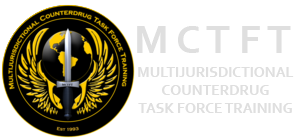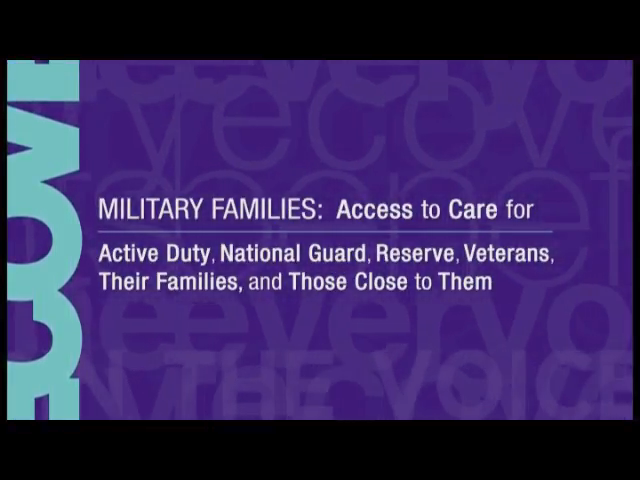This hour-long show produced by the Substance Abuse and Mental Health Services Administration (SAMHSA) will examine the serious issue of behavioral health care needs by exploring the nature and scope of these behavioral health problems, the strengths and weaknesses of the system to address these problems, and the efforts underway to improve our Nation’s ability to meet its obligations to service members and their families.
Specific improvement strategies are highlighted, including collaboration and coordination that increases access to care; community-based solutions that foster access to evidence-based prevention, treatment, and recovery support services; and development of the behavioral health workforce to better serve the military and their families.
Key Concepts:
- How does military deployment affect the spouses and children of service members as well as the service members themselves?
- What is the quality of the health care provided to service members?
- What are the barriers or constraints associated with access?
- What are the costs to society resulting from behavioral health problems among service members returning from war?
- Are there treatment programs in place for veterans?
- What resources are available to help meet the behavioral health needs of military families?
Originally Aired: October 27, 2011
Panelists
A. Kathryn Power, M.Ed.
Director, Center for Mental Health Services (CMHS)
A. Kathryn Power, M.Ed. is the Director of the Center for Mental Health Services (CMHS), Substance Abuse and Mental Health Services Administration (SAMHSA), an operating division of the US Department of Health and Human Services (DHHS).
Prior to her federal appointments, Power served for over 10 years as the Director of the Rhode Island Department of Mental Health, Retardation and Hospitals (DMHRH), a Cabinet position reporting to the Governor and responsible for four systems of care serving individuals with mental illnesses, substance abuse treatment and prevention services, developmental disabilities, and long-term medical needs requiring hospital-level service.
Earlier professional experiences include teaching at elementary, secondary, and university levels; providing counseling, leadership and advocacy for rape crisis and domestic violence service systems and agencies; and working as a computer systems analyst at the Department of Defense.
Director Power received her Bachelor’s degree in education from St. Joseph’s College in Emmitsburg, Maryland, and her Master’s degree in education and counseling from Western Maryland College and is a retired Captain in the U.S. Navy Reserve.
Hector "Z-Man" Zayas
Life in Recovery Coach and Consultant
Zayas employs his personal and professional skills to help those suffering from the disease of alcoholism, especially members of the Armed Forces and their families.
Z-Man is a 21 year veteran of the Air Force and Navy and in long-term recovery from alcoholism. He also assists the addiction professionals’ community in reaching a more in-depth understanding of alcoholism, its power upon those afflicted and alternative approaches to effectively guide their patients toward successful recovery.
Capt. Joan Hunter, RN, MSW
Director of Psychological Health, U.S. Public Health Service, Detailed with the National Guard Bureau
Capt. Hunter is the Director of Psychological Health for the National Guard, a Joint program that supports the behavioral health needs of National Guard members and their families.
Capt. Hunter partners with both the National Guard Bureau’s Manpower and Personnel Directorate, (J-1) as well as the Joint Surgeon’s Office; specifically on availability, accessibility, quality and effectiveness of the full spectrum of psychological health needs and services provided to Guard members and their families.
Capt. Hunter is a Commissioned Officer in the U.S. Public Health Service and has been managing psychological health programs for over 16 years. She has also advised Federal agency Directors on best practices in workplace behavioral health management.
Capt. Hunter has certificates in Advanced Critical Incident Stress Management and Federal Workplace Mediation has received numerous awards for her outstanding service, including the HHS Secretary’s Award for Distinguished Service.
Bradley E. Karlin, Ph.D.
National Mental Health Director for Psychotherapy and Psychogeriatrics, Office of Mental Health Services, Department of Veterans Affairs Headquarters
Dr. Karlin is National Mental Health Director for Psychotherapy and Psychogeriatrics for the U.S. Department of Veterans Affairs (VA), in VA Central Office, in Washington, DC.
He has national responsibility for developing, implementing, and monitoring mental health programs in evidence-based psychotherapy and psychogeriatrics in the VA health care system. Dr. Karlin has developed and oversees national initiatives to disseminate and implement evidence-based psychotherapies for PTSD, depression, serious mental illness, insomnia, and other conditions, for which he received a Certificate of Commendation from the Secretary of the Department of Veterans Affairs.
Dr. Karlin is also Adjunct Associate Professor at the Erickson School of Aging Studies, at the University of Maryland, Baltimore County.

